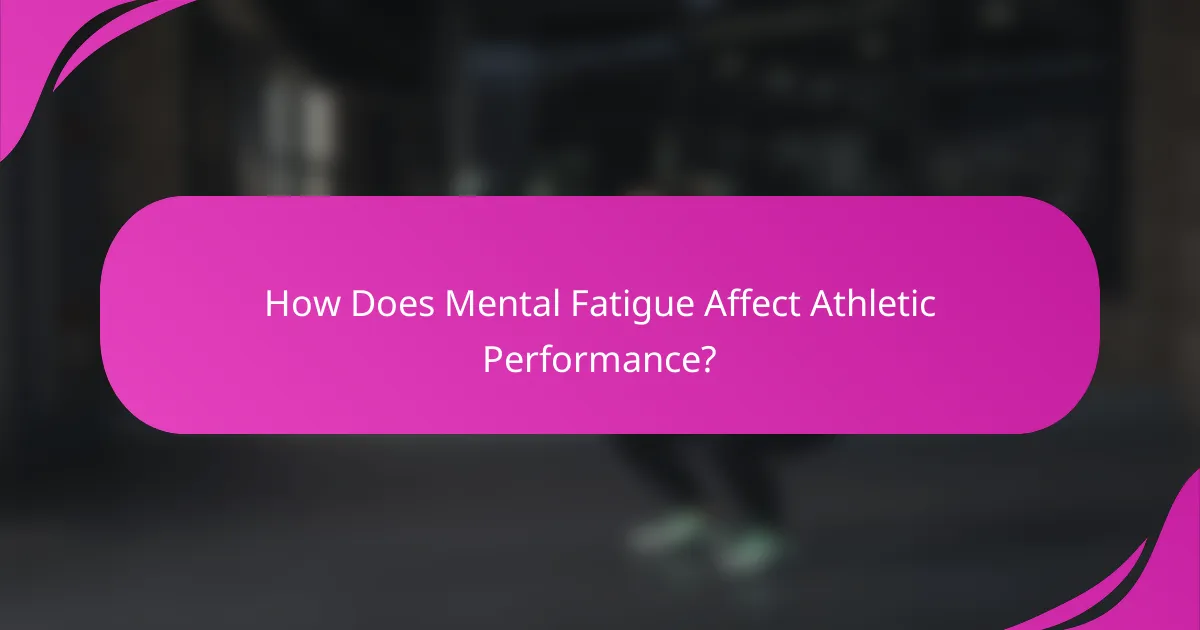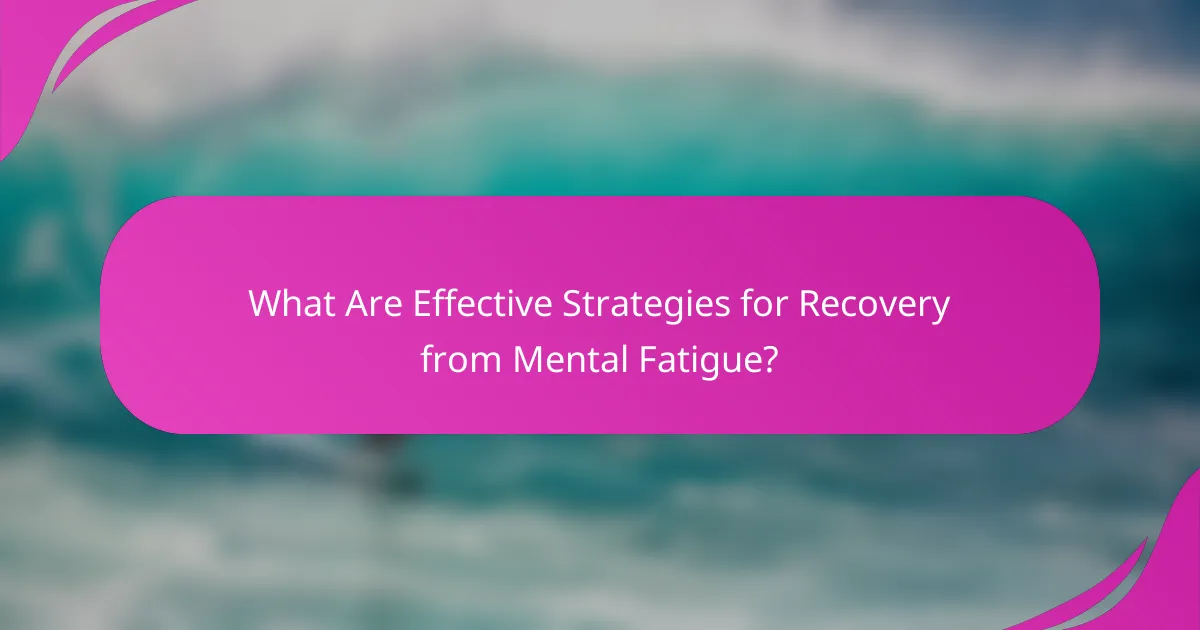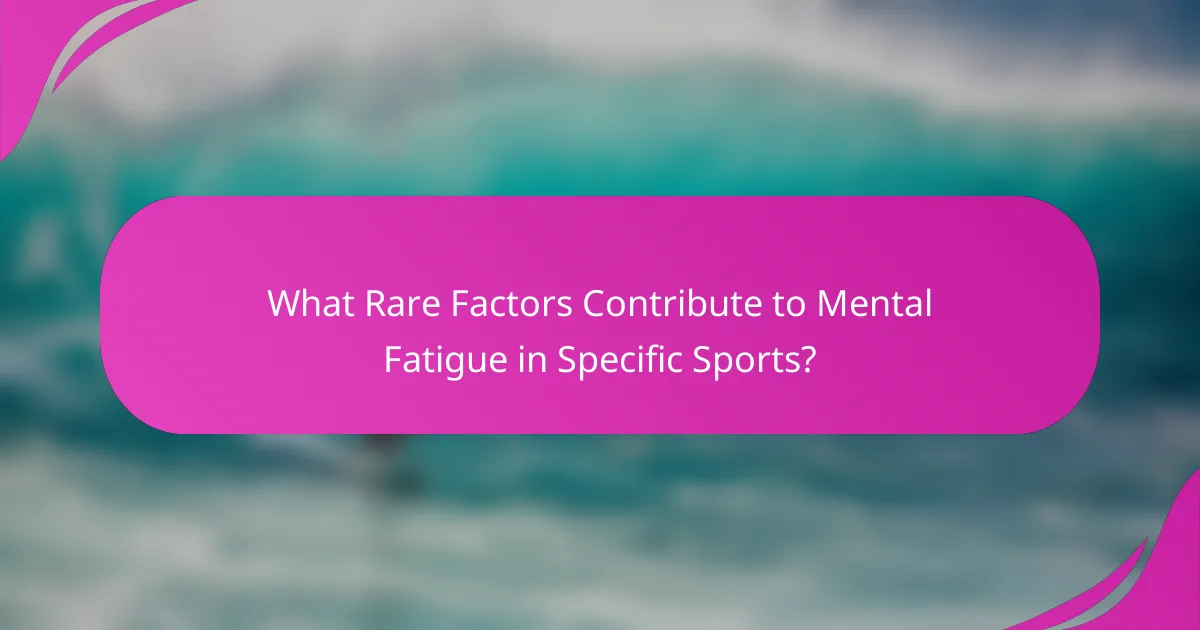Mental fatigue can severely hinder athletic performance by diminishing focus and decision-making abilities. This article explores how mental fatigue arises from overtraining and high-pressure environments, presents effective recovery strategies like mindfulness and structured breaks, and highlights emerging techniques for managing mental fatigue. Understanding these factors can help athletes enhance their focus and improve overall performance.

How Does Mental Fatigue Affect Athletic Performance?
Mental fatigue significantly impairs athletic performance by reducing focus, reaction time, and decision-making ability. Athletes experiencing mental fatigue may struggle to maintain optimal physical output and may be more prone to errors. Strategies for recovery include adequate rest, mindfulness practices, and structured mental training. Incorporating short breaks during training can also enhance overall focus and resilience.
What Are the Signs and Symptoms of Mental Fatigue in Athletes?
Mental fatigue in athletes manifests through decreased motivation, difficulty concentrating, and increased irritability. These signs can severely impact performance and recovery. Athletes may also experience physical symptoms like sleep disturbances and heightened anxiety. Recognizing these symptoms is crucial for implementing effective recovery strategies, such as mental rest, mindfulness practices, and structured training adjustments. Addressing mental fatigue enhances focus and overall athletic performance.
What Are the Physiological Mechanisms Behind Mental Fatigue?
Mental fatigue arises from prolonged cognitive activity, affecting performance through decreased focus and slower reaction times. Neurotransmitter imbalances, particularly in dopamine and serotonin, contribute to this fatigue. As a result, athletes may experience diminished motivation and impaired decision-making. Recovery strategies include proper hydration, nutrition, and rest, which help restore neurotransmitter levels and enhance cognitive function. Incorporating mental recovery techniques, such as mindfulness and visualization, can further improve focus and performance.

What Are Common Causes of Mental Fatigue in Athletes?
Mental fatigue in athletes commonly arises from overtraining, excessive competition, and high-pressure environments. These factors can diminish focus, decision-making, and overall performance. Overtraining leads to physical exhaustion and mental burnout, while competition stress increases anxiety levels. Additionally, a lack of recovery time exacerbates these issues, impacting an athlete’s cognitive function. To combat mental fatigue, strategies such as structured rest periods, mindfulness practices, and cognitive training can enhance focus and recovery.
How Does Training Intensity Contribute to Mental Fatigue?
Training intensity significantly contributes to mental fatigue by increasing cognitive demands during workouts. High-intensity training can lead to greater mental strain, which negatively impacts focus and decision-making. Athletes often experience diminished performance due to this fatigue, making recovery strategies essential. Techniques such as proper rest, nutrition, and mental conditioning can help mitigate these effects and enhance overall athletic focus.
What Role Does Competition Pressure Play in Mental Fatigue?
Competition pressure significantly contributes to mental fatigue, affecting athletic performance. High-stress environments can lead to decreased focus and increased anxiety, hindering optimal performance levels. Athletes may experience cognitive overload due to the need to constantly assess their opponents and strategize. As a result, effective recovery strategies are essential. Techniques such as mindfulness, rest, and mental conditioning can help mitigate mental fatigue, allowing athletes to maintain focus and enhance overall performance.
How Do Lifestyle Factors Influence Mental Fatigue?
Lifestyle factors significantly influence mental fatigue by affecting energy levels, focus, and recovery. Key elements include nutrition, sleep quality, and stress management. A balanced diet enhances cognitive function, while adequate sleep restores mental capacity. Chronic stress increases fatigue and decreases performance. Prioritizing these factors can mitigate mental fatigue and improve athletic focus.

What Are Effective Strategies for Recovery from Mental Fatigue?
To recover from mental fatigue effectively, prioritize rest, hydration, and nutrition. Implement structured breaks during training, focusing on mindfulness techniques. Incorporate sleep hygiene practices to enhance recovery. Utilize visualization strategies to maintain focus and improve performance.
What Role Does Sleep Play in Recovery from Mental Fatigue?
Sleep is crucial for recovery from mental fatigue, enhancing cognitive function and focus. Adequate sleep supports memory consolidation and emotional regulation, vital for peak athletic performance. Research shows that sleep deprivation can impair decision-making and reaction times, negatively impacting athletic focus. Prioritizing sleep can lead to improved recovery, better mental clarity, and enhanced overall performance.
How Can Sleep Quality Be Improved?
Improving sleep quality can significantly enhance mental fatigue recovery and athletic performance. Key strategies include establishing a consistent sleep schedule, creating a restful environment, and incorporating relaxation techniques. For example, reducing screen time before bed can promote better sleep onset. Additionally, physical activity during the day can improve sleep quality, as it helps regulate sleep patterns. Prioritizing sleep hygiene is crucial for optimal recovery and focus in athletic pursuits.
What Nutritional Strategies Can Support Mental Recovery?
Nutrition plays a crucial role in mental recovery from fatigue. Consuming a balanced diet rich in omega-3 fatty acids, antioxidants, and complex carbohydrates can enhance cognitive function and mood.
Key strategies include prioritizing foods like fatty fish, berries, and whole grains. Omega-3 fatty acids, found in fish, support brain health and reduce inflammation. Antioxidants in fruits and vegetables combat oxidative stress, while complex carbohydrates provide sustained energy.
Hydration is essential; dehydration can impair cognitive performance. Aim for adequate water intake throughout the day. Additionally, regular meal timing stabilizes blood sugar levels, enhancing focus and mental clarity.
Incorporating these nutritional strategies can significantly improve mental recovery and athletic performance.
Which Foods Are Beneficial for Mental Fatigue Recovery?
Foods rich in omega-3 fatty acids, antioxidants, and complex carbohydrates are beneficial for mental fatigue recovery. Incorporating fatty fish, berries, and whole grains can enhance cognitive function and energy levels. Omega-3s, found in salmon and walnuts, support brain health. Antioxidants from blueberries combat oxidative stress. Whole grains provide sustained energy, aiding focus. Consuming these foods regularly can improve overall mental performance and resilience against fatigue.
How Can Mindfulness and Relaxation Techniques Aid Recovery?
Mindfulness and relaxation techniques significantly enhance recovery by reducing mental fatigue and improving focus. These practices foster a calm mind, allowing athletes to regain clarity and resilience. Research indicates that techniques like meditation and deep breathing can lower cortisol levels, promoting quicker recovery times and better performance. Incorporating these methods into training regimens can lead to a unique improvement in mental endurance, ultimately benefiting athletic focus and overall performance.

What Unique Recovery Techniques Are Emerging for Athletes?
Emerging recovery techniques for athletes focus on mental fatigue management to enhance performance. Techniques include mindfulness training, neurofeedback, and cognitive behavioral strategies. Mindfulness training reduces stress and improves focus, while neurofeedback optimizes brain function. Cognitive behavioral strategies help athletes reframe negative thoughts, promoting resilience. These unique approaches address mental fatigue’s root causes, leading to improved athletic outcomes.
How Are Wearable Technologies Being Used to Monitor Mental Fatigue?
Wearable technologies are increasingly used to monitor mental fatigue through real-time data collection. These devices track physiological indicators like heart rate variability and sleep patterns, providing insights into an athlete’s mental state. For example, devices can alert users when mental fatigue levels rise, allowing for timely recovery strategies. This proactive approach enhances athletic focus and performance by preventing burnout and optimizing training schedules.
What Innovations in Cognitive Training Are Available?
Innovations in cognitive training focus on enhancing mental resilience and performance recovery. Techniques like neurofeedback, virtual reality simulations, and cognitive behavioral training improve focus and reduce mental fatigue. For example, neurofeedback helps athletes optimize brain function, leading to better concentration. Additionally, mindfulness practices are integrated into training regimens to enhance mental clarity and emotional regulation. These innovations are essential for athletes aiming to sustain peak performance under pressure.

What Rare Factors Contribute to Mental Fatigue in Specific Sports?
Mental fatigue in specific sports can be influenced by rare factors such as environmental stressors, psychological pressure, and unique competition formats. Environmental stressors like altitude or extreme temperatures can exacerbate mental fatigue. Psychological pressure, particularly in high-stakes situations, may lead to cognitive overload, affecting performance. Unique competition formats, such as multi-day tournaments, can also contribute to mental fatigue due to prolonged focus and decision-making demands. Understanding these rare factors can help athletes develop targeted recovery strategies and enhance their focus.
How Does the Nature of Different Sports Impact Mental Fatigue?
The nature of different sports significantly influences mental fatigue levels. Endurance sports like marathon running typically induce higher mental fatigue due to prolonged focus and physical exertion. In contrast, team sports may require intermittent bursts of concentration and strategic thinking, which can also lead to mental fatigue but in shorter durations.
Factors such as the sport’s intensity, duration, and competition level contribute to the degree of mental fatigue experienced. For instance, athletes in high-stakes competitions may face increased pressure, leading to heightened mental fatigue. Recovery strategies, including mental rest and mindfulness techniques, are crucial for athletes to maintain focus and performance.
Understanding these dynamics helps athletes tailor their training and recovery strategies effectively. By recognizing the unique attributes of their sport, athletes can implement targeted approaches to manage mental fatigue and enhance overall performance.
What Psychological Factors Are Unique to Endurance Sports?
Mental fatigue significantly impacts endurance sports performance. Athletes can enhance focus and recovery through specific strategies.
Unique psychological factors include cognitive load, emotional resilience, and motivation levels. High cognitive load can lead to mental fatigue, reducing decision-making quality during events. Emotional resilience helps athletes cope with stress, while intrinsic motivation drives sustained effort.
Recovery strategies involve mental rest, visualization techniques, and mindfulness practices. Mental rest allows the brain to recuperate, while visualization enhances confidence and focus. Mindfulness training promotes awareness and reduces anxiety, improving overall performance.
Incorporating these psychological factors and recovery strategies can lead to improved endurance performance and mental clarity.

What Best Practices Can Athletes Implement for Enhanced Focus?
Athletes can enhance focus by implementing strategies to combat mental fatigue. Prioritizing rest, practicing mindfulness, and utilizing visualization techniques are effective methods.
Resting adequately allows the brain to recover, improving cognitive function. Mindfulness techniques, such as meditation, help reduce stress and enhance concentration. Visualization techniques enable athletes to mentally rehearse performance, increasing confidence and focus during competition.
Incorporating these practices can lead to improved athletic performance by minimizing the impact of mental fatigue.
How Can Goal Setting Improve Focus and Reduce Mental Fatigue?
Goal setting enhances focus and reduces mental fatigue by providing clear objectives and motivation. It directs attention towards specific goals, minimizing distractions. Structured goals also promote effective time management, reducing overwhelm and stress. Research indicates that athletes who set measurable goals experience improved performance and decreased fatigue.
What Are Common Mistakes Athletes Make in Managing Mental Fatigue?
Athletes often make several mistakes when managing mental fatigue, which can negatively impact performance. Common errors include neglecting rest and recovery, failing to recognize signs of mental fatigue, relying solely on physical training, and not utilizing mental strategies for focus.
Neglecting rest leads to prolonged fatigue, diminishing cognitive function and decision-making. Failing to recognize mental fatigue can result in burnout and decreased motivation. Relying only on physical training ignores the importance of mental conditioning. Lastly, not employing mental strategies, such as visualization or mindfulness, can hinder an athlete’s ability to maintain focus during competitions.
What Expert Insights Can Help Athletes Optimize Recovery?
Mental fatigue significantly affects athletic performance, but strategies exist to enhance recovery and focus. Prioritizing mental rest, incorporating mindfulness techniques, and ensuring quality sleep can optimize recovery. Nutrition also plays a crucial role; consuming omega-3 fatty acids and antioxidants supports cognitive function. Engaging in light physical activity can further alleviate mental fatigue, promoting a quicker return to peak performance.